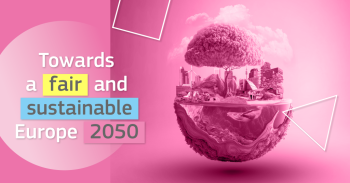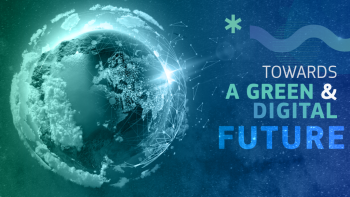Since 2020, the European Commission has been producing annual Strategic Foresight Reports, which inform the Commission's Work Programmes and multi-annual programming exercises.
The Joint Research Centre's Competence Centre on Foresight plays a central role in developing and implementing the participative and cross-sectoral foresight processes that underpin the annual Strategic Foresight Reports. This page features the corresponding JRC Science for Policy reports, which outline the foresight approach and present the key insights generated.
Strategic Foresight Report 2025

Resilience 2.0: Empowering the EU to thrive amid turbulence and uncertainty
The 2025 Strategic Foresight Report presents "Resilience 2.0", an approach to ensuring the EU thrives in turbulent times towards 2040 and beyond. It builds on the recent EU Preparedness Union Strategy and recognises the need to scan proactively not only for emerging risks but also for future opportunities, and to consider unfamiliar or even hard-to-imagine scenarios. This year the Strategic Foresight Report is not accompanied by a Science for policy report from JRC.
Read the Commission communication
Strategic Foresight Report 2023

Towards a Fair and Sustainable Europe 2050: Social and Economic Choices in Sustainability Transitions
Amidst the pressing challenges posed by the climate crisis and related extreme weather events, environmental degradation, as well as biodiversity loss, it becomes increasingly evident that swift and extensive action is imperative worldwide. As a leading force in the fight against climate change, the European Union is resolute in its commitment to achieve climate neutrality by 2050. Expanding on the previous year’s analysis, which outlined 14 requirements for successful “twin” digital and green transitions, this study provided the foresight input to the European Commission’s 2023 Strategic Foresight Report by delineating key areas and measures in the social and economic spheres. It places the wellbeing of people, as well as social and economic fairness as fundamental principles within all sustainability endeavours.
This foresight study explores possible and necessary changes in the European social and economic systems as the European Union engages in managing sustainability transitions towards 2050. With this focus, the study presents strategic areas of intervention covering a new social contract, governance for sustainability, people and economy, and the global perspective on sustainability. The study reflects on the agency of EU actors (such as government at various levels, business, and communities) to address the strategic areas of intervention as part of collectively addressing sustainability transitions. .
Discover the report
The JRC Science for Policy report builds on a participatory foresight exercise, which generated four foresight scenarios for a climate-neutral EU in 2050. Based on each scenario, a corresponding transition pathway was co-created and analysed through the process. The study presents and analyses these outputs of the process. The outputs can also serve as input to policymakers and practitioners interested in conducting new participatory exercises on sustainability transitions
This report forms the basis of 2023 Strategic Foresight Report.
Further reading
Communication - 2023 Strategic Foresight Report
Strategic Foresight Report 2022

Towards a green & digital future
To keep the planet liveable and seize economic opportunities, the European Union is engaging in a swift and inclusive transition towards environmentally sustainable lifestyles and economies towards 2050, based on the European Green Deal. The green transition aims to achieve sustainability, and combat climate change and environmental degradation. At the same time, the growing significance of digital technologies is transforming societies and economies. In the digital transition, the European Union aims to harness digital technologies for sustainability and prosperity, and to empower citizens and business.
The green and digital ‘twin’ transitions are the cornerstone for delivering a sustainable, fair and competitive future. There is no time to waste, and the twin transitions must be achieved together. To unlock their potential and to prevent negative effects, the green and digital transitions require a proactive and integrated approach.
Discover the report
This JRC Science for Policy report examines how the green and digital transitions can be successful. Both the green and the digital transitions are political priorities of the European Commission that will shape our future in the long-term.
The study is the result of a thorough literature review and expert engagement in discussions and workshops with over 200 participants from academia, civil society, public administration, and industry.
The researchers at the JRC used a normative back-casting approach, which means they took the goals of the European Green Deal as a starting point, and then examined the opportunities and pitfalls in the green and digital transitions in achieving this goal.
This report forms basis of 2022 Strategic Foresight Report
Further reading
Communication - 2022 Strategic Foresight Report
Strategic Foresight Report 2021
Shaping & securing The EU’s Open Strategic Autonomy
The importance of open strategic autonomy has been stressed in several Commission policy initiatives such as the trade policy review and update of the new industrial strategy. The concept includes the ambition for the EU to assume greater responsibility for its own security, reduce one-sided dependencies in critical areas and strengthen its capacity to set and implement its own priorities. This concept has been brought to light by the Covid-19 pandemic, which has exposed vulnerabilities in Europe (e.g. disrupted medical supplies during the lockdown).
The objective of the foresight process was to look at Open Strategic Autonomy in a systemic way, encompassing different dimensions and look at them in a holistic manner. Desk research, including literature review and policy analysis, synthetises existing knowledge on the current state and future possibilities in 2040 and beyond. The report presents an overview of Europe’s existing capacities, dependencies and vulnerabilities. It also describes trends and emerging issues, looking forward at how they could evolve over time, and looking at the opportunities and risks they entail.
Discover the report
The report presents foresight scenarios on the global standing of the EU in 2040, in relation to Open Strategic Autonomy. They point to ways for the EU to build preparedness through anticipation. A Delphi enquiry enabled the engagement of experts who assessed and ranked the identified 'forward-looking issues' in terms of their relevance for shaping and securing the EU’s Open Strategic Autonomy towards 2040. The report outlines implications for leveraging the EU’s capacity to implement an Open Strategic Autonomy by 2040 and beyond. It highlights the ways in which the EU can use its existing strengths and develop further capacities, both by itself and through alliances. .
This report forms basis of 2021 Strategic Foresight Report
Further reading
Communication - 2021 Strategic Foresight Report
Strategic Foresight Report 2020
Charting the course towards a more resilient Europe
The 2020 Strategic Foresight Report, ‘Charting the course towards a more resilient Europe’ discusses the first structural lessons learnt from the COVID-19 crisis, and explaines how foresight can help strengthen Europe’s long-term resilience in an era of fundamental and rapid change. It analyses the EU’s resilience across four dimensions: social and economic, geopolitical, green and digital.
Discover the report
The first Strategic Foresight Report presents the Commission’s strategy to integrate strategic foresight into EU policy-making. It identifies first lessons from the COVID-19 crisis, introduces resilience as a new compass for EU policy-making and discusses the role of strategic foresight in strengthening the resilience of the EU and its Member States. The report analyses resilience along four interrelated dimensions – social and economic, geopolitical, green and digital – and explains its importance for achieving our strategic long-term objectives in the context of the digital, green and fair transitions.
Further reading
Communication - 2020 Strategic Foresight Report
Related sources
European Commission Strategic foresight webpage
| Originally Published | Last Updated | 08 Jul 2024 | 12 Sep 2025 |
| Related organisation(s) | SG - Secretariat-GeneralJRC - Joint Research CentreESPAS - European Strategy and Policy Analysis System |
| Knowledge service | Metadata | Foresight | Sustainability Transitions |
| Digital Europa Thesaurus (DET) | foresight |
Share this page
